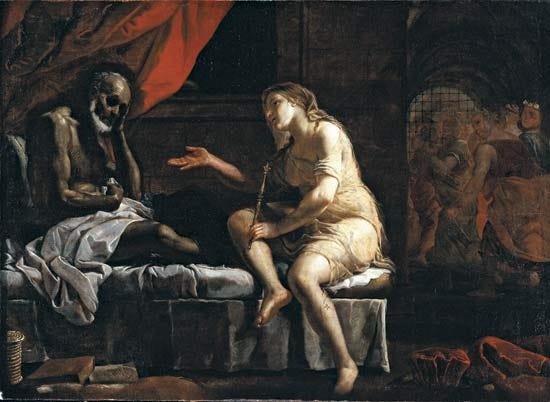A spiritual journey with Boethius: part 1
Dr Sarah-Jane Murray from The Greats Story Lab reveals what 5th century Boethius can teach us about the highs and lows of life.
Mattia Preti: Boethius and Philosophy
When the bottom falls out
What do you do when your world collapses?
We’ve all felt it in different ways. A sudden diagnosis. A betrayal. The job that vanishes. The marriage that fractures. Many of us know what it feels like to watch everything we counted on fall away.
In 524 AD, Boethius lost everything.
He had been one of the most brilliant minds in the Western world: a philosopher, poet, scholar, and trusted political advisor. In the waning days of the Western Roman Empire, he rose to power under King Theodoric of Italy, serving first as consul and then as the king’s trusted advisor and right-hand man. But when his friend and fellow consul, Albinus, was accused of treason, Boethius spoke up in his defense. It was a fatal mistake.
Within days, Boethius was arrested, sentenced to death without trial, and thrown into prison to await his execution. In that dark cell, he began to write a strange and inspiring book called The Consolation of Philosophy. It opens with tears: Boethius is broken, bewildered, and grieving. He cries out for meaning.
Then one night, in the silence of his despair, a mysterious woman enters the prison. She is not a dream or an angel. She is something stranger still.
He calls her Lady Philosophy. And she does not come to comfort him: she comes to wake him up.
Boethius, Book 1: The Woman Who Appears
A figure appears without warning.
Boethius, alone in his cell, grieves the collapse of everything he once trusted. He weeps as he recollects all that he has lost: his position, his family, his reputation, and even his freedom. He served faithfully and acted with integrity. How did it come to this? The Muses of Poetry inspire his sad words and he sinks further and further into depression.
That’s when it happens.
He senses something and looks up. A woman is towering over him, tall and commanding. Her eyes pierce him to the very core. In one hand she holds a book, and, in the other, a scepter. Her robe is torn, because people over the centuries have attempted to grab pieces of it as if to claim a shard of learning for themselves. Boethius does not recognize her at first. Then she speaks.
This is Lady Philosophy.
She has not come to speak sweetly or to soothe his pain and reassure him that everything will be okay. There is nothing sentimental about her. And her first order of business is to banish the Muses—she has some choice words for them and calls them hussies. They’re only making the prisoner’s condition worse. They are no longer needed here, she says, and she will replace them with her own Muses, of Philosophy.
Then, she rebukes Boethius himself.
“You’ve forgotten who you are,” she says. “You’ve forgotten what you once knew.”
It’s a hard thing to hear. But it’s the beginning of his healing.
Sometimes, when we’re suffering, we want quick relief. And yet, what we actually need is something deeper: a recovery of truth, and of the self. Lady Philosophy reframes Boethius’s pain. His sorrow is real. But it’s not the end of the story.
And maybe that’s the beginning of wisdom: not denial or even blind optimism. But simply remembering who we are, and who God is, when everything else falls apart.
Book 1, Part 1:
Book 1, Part 2:
To continue the story click here for part 2, book 2 and 3.
Written and produced by The Greats Story Lab™, lead by Dr Sarah-Jane Murray who is a tenured Professor at Baylor University in Austen, and their Head Imagineer - Courtney Becker. Their goal is to help a new generation of people engage with some of the greatest stories ever told using new media or as they have coined edumedia. The Greats Story Lab™ has been nominated and winners of 18 juried awards including the gold Tellys. Sarah-Jane Murray is herself Emmy nominated and has been lauded in the Times Literary Supplement for her work on the 3 volume; The Moralized Ovid (D.S. Brewer, 2023), with co-translator Dr Mathieu Boyd.

